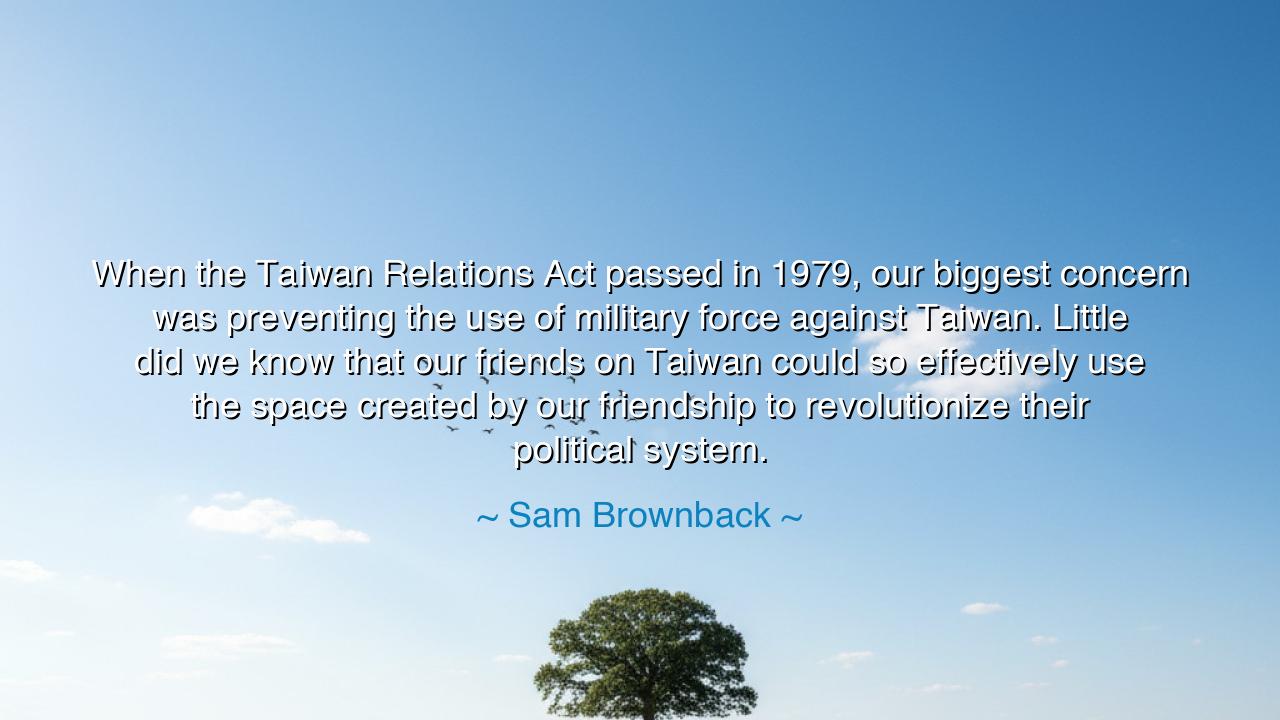
When the Taiwan Relations Act passed in 1979, our biggest concern
When the Taiwan Relations Act passed in 1979, our biggest concern was preventing the use of military force against Taiwan. Little did we know that our friends on Taiwan could so effectively use the space created by our friendship to revolutionize their political system.






“When the Taiwan Relations Act passed in 1979, our biggest concern was preventing the use of military force against Taiwan. Little did we know that our friends on Taiwan could so effectively use the space created by our friendship to revolutionize their political system.” — in these words, Sam Brownback speaks not only of diplomacy and policy, but of a deeper truth that transcends nations. He speaks of friendship between peoples, of the power of freedom, and of the unseen strength that lies within a nation when it is given room to breathe, to grow, to shape its own destiny. His words echo the wisdom of the ancients: that true friendship does not seek to control, but to empower; that the greatest gift one can give is not protection, but space for transformation.
In the year 1979, the world shifted. The Taiwan Relations Act was born in a time of uncertainty, when the tides of power were changing across the Pacific. The United States, having reestablished relations with mainland China, sought to ensure that Taiwan—a small island of courage and innovation—would not be swallowed by the storms of force and domination. The Act was a promise: that though official recognition had changed, friendship and support would endure. Its architects feared the clash of arms, yet few foresaw the deeper revolution that would unfold—not of blood, but of ideas, not of conquest, but of conscience.
For in the shelter of this act, Taiwan began to blossom. Protected from the threat of war, the island turned its gaze inward, transforming itself from a military-led regime into a vibrant democracy. In the decades that followed, the people of Taiwan—once bound by martial law—learned to speak freely, to vote, to challenge authority, to build a nation founded upon the will of its citizens. What had begun as a cautious defense became a cradle of liberty. Thus, Brownback’s words remind us that the true power of friendship is not found in the shield, but in the soil it guards—the soil from which freedom can take root and grow tall.
This story calls to mind the ancient parable of the gardener and the seed. The gardener may protect the seed from frost and storm, but it is the seed itself that must reach toward the light. So it was with Taiwan. The space created by friendship—the calm after the threat of war—became the fertile ground upon which a nation’s spirit grew. And like the bamboo that bends but does not break, Taiwan learned resilience, learned grace, and rose to stand as a symbol of what courage and cooperation can achieve together.
There is also a deeper moral for the generations that follow. When nations, or even individuals, use friendship not as a leash but as a liberating trust, they awaken something divine within the human heart. True allies do not dictate—they believe. They do not command—they encourage. And in doing so, they become partners in creation, midwives of progress. The relationship between the United States and Taiwan, born of necessity, evolved into a testimony of this principle: that freedom, once given a chance, can build miracles no force could ever compel.
Let this wisdom echo across time: power restrained by compassion becomes greatness. To prevent destruction is noble, but to nurture renewal is divine. When friendship is offered not as dominance but as faith, it becomes the forge of transformation. The ancients would have called such a bond sacred, for it embodies the highest of virtues—trust.
To all who read these words: whether you are a leader, a teacher, or a simple friend, remember this lesson. Create space for others to grow. Defend them when needed, but never smother their spirit. Be the kind of friend who shelters without stifling, who believes without binding. For in that sacred space—between trust and freedom—lies the possibility of all human flourishing.
Thus, in the light of Sam Brownback’s reflection, we see that the true legacy of the Taiwan Relations Act was not merely geopolitical—it was moral. It showed the world that friendship, when rooted in respect, can become a seed of democracy, a flame of hope, and a testament to the unyielding strength of the human will. May every nation, and every soul, learn to wield such friendship—with wisdom, humility, and faith in the power of freedom.






AAdministratorAdministrator
Welcome, honored guests. Please leave a comment, we will respond soon